- Home
- Robert B. Parker
Valediction s-11
Valediction s-11 Read online
Valediction
( Spenser - 11 )
Robert B Parker
Spenser Book 11
Valediction
Robert B. Parker
Copyright © 1984
For Joan,
like gold to airy thinness beat
Dull sublunary lovers' love (Whose soul is sense) cannot admit
Absence, because it doth remove
Those things which elemented it.
John Donne,
A Valediction:
Forbidding Mourning
CHAPTER 1
There were at least three kinds of cops in Harvard Yard: a scattering of Cambridge cops, gray-haired mostly, with faces out of County Mayo; portly old men in brown uniforms and no sidearms who guarded the gates; and squadrons of Harvard University police who wore tailored blue uniforms and expensive black gun belts, and looked like graduates of the Los Angeles Police Academy. It was Harvard commencement, and if the WASPs began to run amok, Harvard was ready. I was ready too. I had a Smith & Wesson Chief's Special clipped onto my belt just back of my right pants pocket where the butt caused only a modest break in the line of my silk tweed jacket. The jacket was off-white with a faint blue weave and came from Brooks Brothers. It wasn't my favorite, but the choices are not wide in off-the-rack size 48's.
On a folding chair among many many folding chairs set up on the broad lawn between Widener Library and Memorial Church, Susan Silverman sat in a black gown and a funny-looking mortarboard and waited for the formal award of her Ph.D. in clinical psychology. I was there to watch and although I had a seating ticket I found myself getting restless very early and began to wander around the yard and look at the preparations for postcammencement festivities when graduates are congratulated and classes are reunited and funds are raised.
All about me the subdued and confident honk of affluent Yankee voices, male and female, murmured a steady counterpoint to the Latin dissertation being delivered from the commencement platform and redelivered over speakers throughout the area. It had been the excitement of the Latin address that had initially got me up and walking around and eyeing the barrels of free beer hooked to the taps, ready to be broached when the graduates were official.
The Latin address gave way to an English disquisition on the Legacy of Confusion, which in turn gave way to an English address on the Moral Life. On the steps of Boylston Hall a bunch of men in top hats and tails were having their pictures taken with a bunch of women in white dresses and red sashes. I went into the basement of Boylston Hall to use the men's room. No one else was there. Maybe one didn't do that at a Harvard commencement. Maybe Harvard people didn't do that at all.
Finally it was over and Susan met me by the beer table, pushing her way past a procession from Quincy House that was being led out by u guy blowing bagpipes.
"How do you like it so far," she said.
I kissed her on the mouth. "I don't know that I've ever screwed a doctor," I said.
She nodded. "Yes, I knew you'd have just the right thing ready to say."
Even in her cap and gown Susan looked like a sunrise, extravagant and full of promise. Wherever she went things seemed, as they always did, to organize around her.
She smiled at me. "Shall we have some of the revolting chicken salad?"
"Your graduation," I said.
We had the chicken salad and a couple of free beers and watched everything and spoke very little. Susan was excited. I could see it in her face. She was looking at everything and barely eating. I looked mostly at her, as I always did, trying somehow to encompass the density and elegance of her. Never enough, I thought. It's like air, you never tire of breathing it.
"Did you like the ceremony?" Susan said.
I nodded. "The Latin dissertation made my blood race."
"But it really was wonderful, don't you think?"
I shrugged.
"I know it's silly, but it's very exciting. It's full of tradition and it makes me feel like a real part of something. It's what a graduation ought to be."
"And you are now a doctor. Dr. Silverman. You like that?"
She nodded.
Around the yard, hanging from old brick buildings, were signs designating class years -1957, 1976-and old grads were gathering under those banners to talk about how fast they could run when they were young, and get zonkered on bloody Marys and vodka martinis in clear plastic cups.
"You going back to D.C.?" I asked it casually, glancing around at the Radcliffe graduates. But my stomach wasn't casual when I said it. My stomach was clenched tight and full of dread.
Susan shook her head a little vaguely, one of those little head gestures she made that meant neither yes nor no.
"Chicken salad really isn't very good, is it?" she said.
"No, it's awful," I said. "But the servings are small."
CHAPTER 2
At six o'clock we were sitting at the counter in my kitchen sharing a victory bottle of Cuvée Dom Pérignon, 1971.
"Veritas, " I said to Susan. She smiled and we drank. My kitchen window was open and the breeze that blew off the Charles River basin moved a few of the outer curls on Susan's dark hair. It had been sunny all day, but now it was ominous-looking outside with dark clouds, and the breeze was chilly.
Between us on a large plate there was French bread and wheat crackers and goat cheese, milk-white with a dark outer coating, and some nectarines and a bunch of pale green seedless grapes.
Susan said, "I've taken a job in San Francisco."
I put the glass down on the counter. I could feel myself begin to shrink inward.
"I'm leaving tonight," she said. "I had planned to stay the night with you and tell you in the morning, but I can't. I can't not tell you."
"How long," I said.
"I don't know. I've thought about it for a long time. All the last year in Washington when I was doing my internship."
It began to rain outside my kitchen window. The rain coming straight down from the darkened sky, quietly, with a soft hiss.
"I have to be alone," Susan said.
"For how long?"
"I don't know. You can't ask me, because I really don't."
"I'll visit you."
"Not right away. I have to be by myself. For a while anyway, I don't want you to know my address."
Bubbles continued to drift up from the bottom of the champagne glass, spaced more as the champagne flattened, coming sparsely and with leisure. Neither of us drank.
"You have a place to stay out there?"
"Yes. I've arranged that already."
Her hair stirred again. The wind was cold now, and damp from the rain that moved steadily downward through it. One lightning flash flared a moment at the window and then, an appreciable time later, the thunder rolled in behind it.
"I called Paul," Susan said. "He'll be here in the morning. I didn't want you to be alone." I nodded. The curtains at the kitchen window moved in the cold breeze. Susan stood up. I stood with her.
"I'm going to go now," she said. I nodded.
She put her arms around me and said, "I do love you."
"I love you."
She squeezed me and put her cheek against mine. Then she stepped away and turned and walked toward the door.
"I'll call you," she said, "when I get to San Francisco."
"Yes."
She opened the door and looked back at me.
"Are you all right," she said. I shook my head.
"Paul will come tomorrow," she said. "I'll call you soon."
Then she went out and closed the door and I was alone with my soul dwindled to icy stillness at the densely compacted center of myself.
CHAPTER 3
When Paul Giacomin arrived I was still sitting at the counter. The
champagne bottle was full of flat champagne and the two glasses, half drunk, were beside it. I was drinking coffee. Outside, the rain fell with undeviating purpose.
Paul put his suitcase down and came over. "How are you," he said.
I shook my head. "Susan gone?" he said.
I nodded. "Last night," I said.
He started the burner under the hot water. "You sleep?" he said.
"No."
"You understand this?" Paul said. The water heated quickly because I had just used some. He poured the boiling water into a cup and added a spoonful of coffee, and stirred. He always made coffee that way.
"Yes," I said. I stood and went and looked out the window in the living room. It was raining out there too.
"I'm willing to listen if you want to talk about it," Paul said. "Or I'm willing to shut up if you want to do that."
"Talking may be overrated," I said.
"Maybe," Paul said. "But you'll think about it. Whether or not you talk is just whether or not you share what you're thinking."
"Smartass college kid," I said.
The morning was a dark background on Marlborough Street, people going to work carried colorful striped umbrellas, students going to summer school wore blue and green and yellow slickers, the flowers in the small yards glistened in the rain and the street itself gleamed wetly. The traffic was mostly cabs and the cabs were mostly yellow.
"When she went to Washington," I said, "and did her predoctoral internship she got a taste of being a full person, nobody's wife, nobody's girlfriend, nobody's employee, but a full professional person whose worth was in her knowledge and her insight and her compassion."
Paul sipped his coffee. I leaned my head against the window and watched the street glisten.
"She couldn't be that with you?" Paul said.
"I think she's trying to find out what she can be," I said. "I have . . . I have a view of the world that is pretty fully formed . . . and I cling to that view pretty hard. It doesn't leave Susan too much room. Or you."
"I don't think Susan disagrees with too much of what you hold to be self-evident," Paul said.
I shrugged.
"On the other hand, perhaps she'd like to arrive at those truths herself."
"Yes," I said. "Or maybe think her own thoughts and not have to compare them with mine."
Paul came and stood beside me and looked down at Marlborough Street with me.
"You wondering if maybe you've been a little too rigid?" Paul said.
"I'm considering the possibility that there are ways to be a good person that I hadn't thought of," I said.
"Might help loosen things up for you," Paul said. "It must always have been hard being you."
"Not as hard as this," I said.
"I know."
The wind had strengthened coming off the river and the flower petals began to litter the sidewalk, limp and wet.
"I won't quit on this," I said.
"Pressing her will make it worse," Paul said.
"I know."
"So what will you do?"
"For now I'll wait."
"Then what?"
"I don't know."
Paul nodded. "Hard," he said. "Hard as hell not to know."
We were quiet. There wasn't anything to say. Below me some of the wet flower petals on the sidewalk washed into the gutter. And the rain kept coming.
CHAPTER 4
Henry Cimoli had a full range of Nautilus equipment installed at the Harbor Health Club. The whole place was getting out of hand. There were women in there now as well as men. There was a lounge where you could sit around in a velour sweat suit and drink carrot juice, there had been complaints that the speed bag in the boxing room made too much noise, and some of the people working on the Nautilus wore Lacoste shirts. Hawk had told Henry that if anyone came in to work out wearing Top-Siders that he, Hawk, would demand a refund on his membership.
"Hawk," Henry said, "you come here free."
"Fucking place is full of guys in tennis shorts," Hawk said.
"Hell, you even get the tanning booth free," Henry said.
Hawk looked at him. "Wimp city," he said, and walked away.
"He just don't understand upscale," Henry said.
A club member stopped beside us to sign in. He was wearing a dark blue sweatband on his head and dark blue wristbands and a raspberry-colored Lacoste shirt and white tennis shorts and knee socks with red and blue stripes around the top and Fred Perry tennis shoes. There was a Sony Walkman at his waist and fluffy red earphones over the sweatband. He smelled of Brut.
I looked at Henry. "Wimp city," I said, and went after Hawk.
Hawk worked out in a pair of old boxing shorts and high boxer's shoes and no shirt. When I joined him he was doing chest presses on the machine. He had the pin in at maximum weight and was doing the exercises with no visible effort except for the glistening film of sweat. With the gym lights glaring down on him the black skin on his torso and shaved head gleamed like the wet asphalt had the morning Susan left. People watched him covertly as the muscles in his arms and chest bunched and relaxed.
I did some curls. It was hard to do what until recently I had done easily.
When I got through Hawk was off the bench press machine and we swapped places. In the boxing room I never did get a good rhythm on the speed bag and there was no bite in my punches on the heavy bag. Hawk made it dance, but I just bludgeoned it. We took some steam and then showered. We were the only ones in the shower room.
"Something wrong with you," Hawk said. It wasn't a question.
"You just noticed?" I said.
"Besides being a honkie and a preppie and a fucking bleeding heart. Something wrong with you."
"Susan moved to San Francisco," I said. Hawk let the hot water run over him and the lathered soap slid away.
"Get dressed," Hawk said. "I buy you a drink-"
We walked across Atlantic Avenue to the Market and sat at the bar in J. J. Donovan's Tavern, I had Irish whiskey on the rocks.
"You still drinking that stuff," Hawk said.
"True to my heritage," I said.
"What do I drink?"
"Rum."
Hawk ordered Mount Gay rum on the rocks. "Rum, religion, and slaves," he said. "Cradle of liberty."
The drinks came. We had a taste.
"What she doing in San Francisco," Hawk said.
"Job."
"You going to visit?"
"I don't know her address." We drank some more.
"She going to tell you where she lives?" Hawk said.
"Maybe in a while."
"Want me to find her?" he said.
"No. She's got the right to be private."
"She got somebody out there?" Hawk said.
"I don't know."
"If she got somebody, I can kill him," Hawk said.
I shook my head again. "She's got a right to somebody else," I said. Hawk gestured another round at the bartender.
"You too," Hawk said.
"I don't want anyone else."
"Thought you wouldn't."
The thing I like about Irish whiskey is that the more you drink the smoother it goes down. Of course that's probably true of antifreeze as well, but illusion is nearly all we have. The bar was half empty. Two young women sat at the bar near the door and kept in eye out. A young couple played Space Invaders behind us in the corner.
One of the young women at the door was looking at Hawk. There was interest in her look, and fear.
"Take some balance," Hawk said. It was as if he were thinking out loud. "Be like carrying a glass of water filled right to the top and not spilling any. Be a bitch."
"Yes," I said.
"This is something you can't fix," Hawk said. "You got to trust her to do it."
"It's my life, in some sense or other."
Hawk nodded. "I'd trust Susan with mine." he said.
I looked at Hawk's peaceful, deadly face. Obsidian skin tight over intricate muscle and prominent bone.
> "Yes," I said. "I would too."
CHAPTER 5
Paul was with me for the summer. He had a job with a small company in Boston called the Tommy Banks Dancers. The pay was negligible, but it was a chance to perform and Tommy Banks was, Paul said, legitimate.
"Performance is different," Paul said. "You can take classes all your life, and rehearse forever, but you make more progress in one performance than you do in a year of lessons."
We were having dinner, in my kitchen. "Sure," I said. "Performance is the actual thing. The other stuff is getting ready." Supper was cold poached salmon fillets with dill mayonnaise, and boiled new potatoes and peapods. Paul got up to get a second bottle of Rolling Rock Extra Pale from the refrigerator. He held it up at me, I shook my head. He opened it and sat back down.
"You feel like working?" he said.
"Have to eventually," I said.
"One of the dancers in the company has disappeared."
"Cops been notified?"
Paul shook his head. "Tommy doesn't want them. It's his girlfriend."
"Why no cops?"
"I don't know. It's a little strange. But I told Tommy I'd ask you. Are you ready to do something? I don't want you to do it unless you're ready."
"Better than hanging around watching Family Feud," I said.
Paul drank some beer from the bottle. "I knew you'd be enthusiastic," he said.
The phone rang. I answered on the first ring. Susan's voice said, ''Hello."
It was difficult to get air in. I said, "How are you?"
Paul looked at me and then got up and walked to the living room and turned on the television.
"Good," Susan said. "I'm good. How are you?"
"Functional," I said. "Sort of."
"Paul still there?"
"Yes. He'll be here all summer."
"Are you working?"
"I haven't. But Paul's asked me to do something. And I said I would. I'm having a little trouble with my energy levels."
"Yes," Susan said.
"You got a nice apartment?" I said.
"Yes. It's small. But it's modern. I'm subletting it for a couple of months. You want my telephone number?"

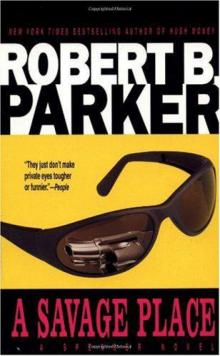 A Savage Place s-8
A Savage Place s-8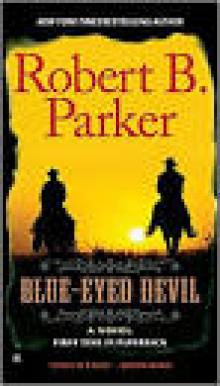 Appaloosa / Resolution / Brimstone / Blue-Eyed Devil
Appaloosa / Resolution / Brimstone / Blue-Eyed Devil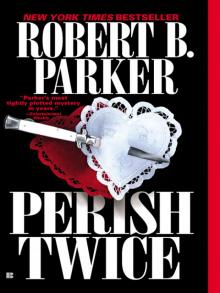 Perish Twice
Perish Twice Spare Change
Spare Change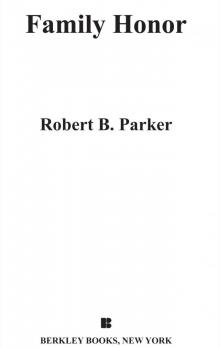 Family Honor
Family Honor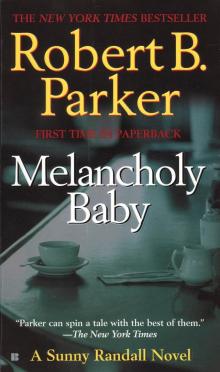 Melancholy Baby
Melancholy Baby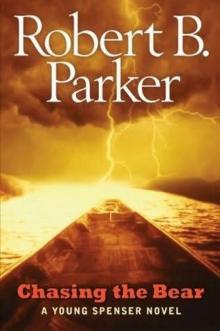 Chasing the Bear
Chasing the Bear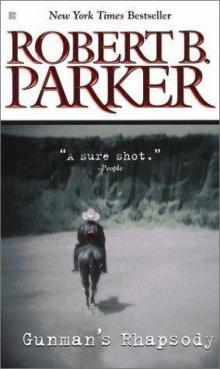 Gunman's Rhapsody
Gunman's Rhapsody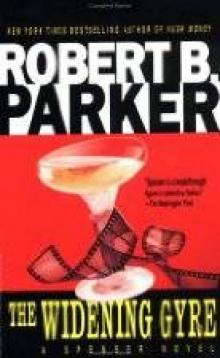 The Widening Gyre
The Widening Gyre Thin Air
Thin Air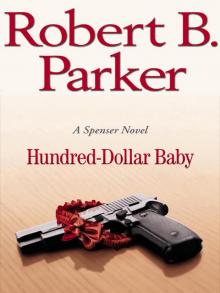 Hundred-Dollar Baby
Hundred-Dollar Baby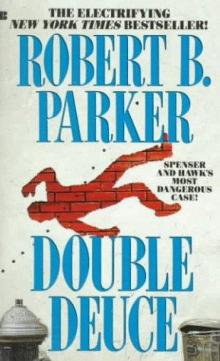 Double Deuce s-19
Double Deuce s-19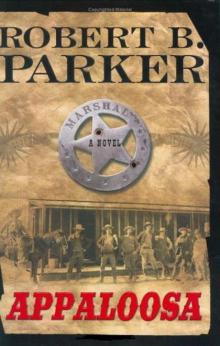 Appaloosa vcaeh-1
Appaloosa vcaeh-1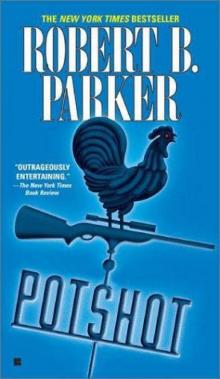 Potshot
Potshot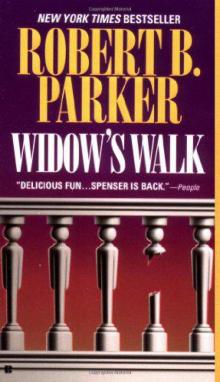 Widow’s Walk s-29
Widow’s Walk s-29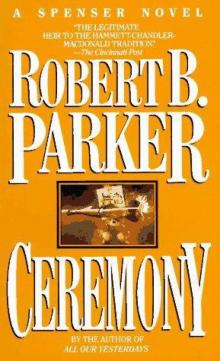 Ceremony s-9
Ceremony s-9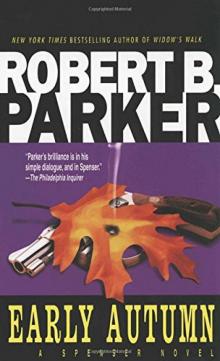 Early Autumn
Early Autumn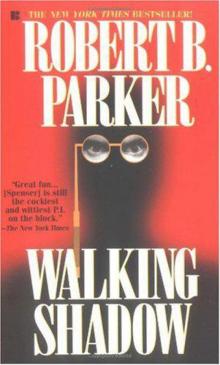 Walking Shadow s-21
Walking Shadow s-21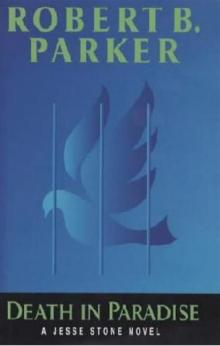 Death In Paradise js-3
Death In Paradise js-3 Shrink Rap
Shrink Rap Blue-Eyed Devil
Blue-Eyed Devil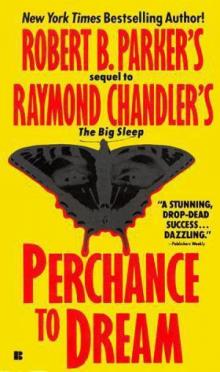 Perchance to Dream
Perchance to Dream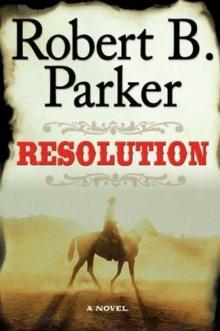 Resolution vcaeh-2
Resolution vcaeh-2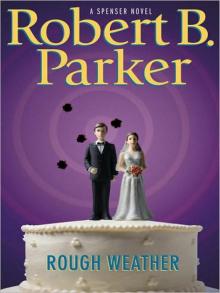 Rough Weather
Rough Weather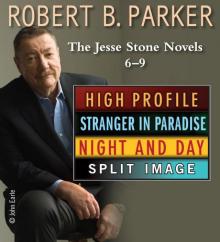 The Jesse Stone Novels 6-9
The Jesse Stone Novels 6-9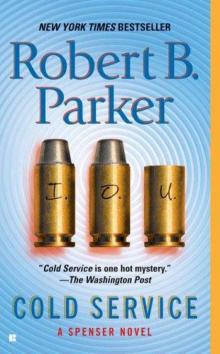 Cold Service s-32
Cold Service s-32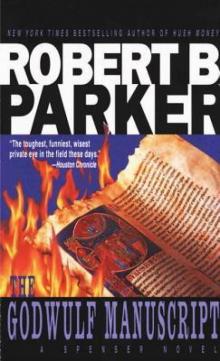 The Godwulf Manuscript
The Godwulf Manuscript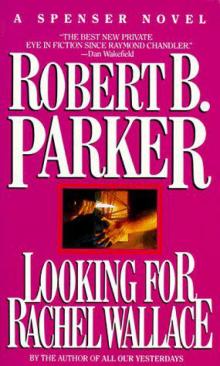 Looking for Rachel Wallace s-6
Looking for Rachel Wallace s-6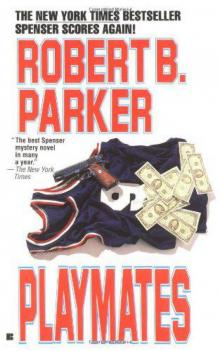 Playmates s-16
Playmates s-16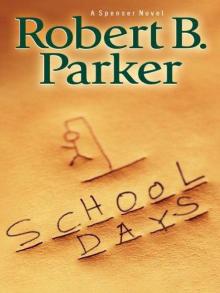 School Days s-33
School Days s-33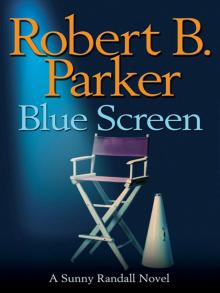 Blue Screen
Blue Screen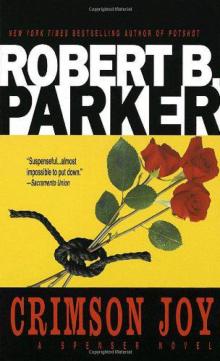 Crimson Joy
Crimson Joy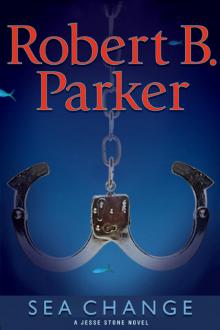 Sea Change js-5
Sea Change js-5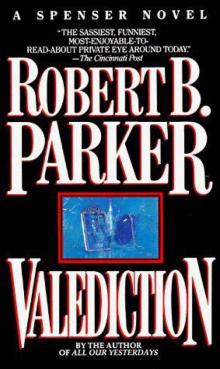 Valediction s-11
Valediction s-11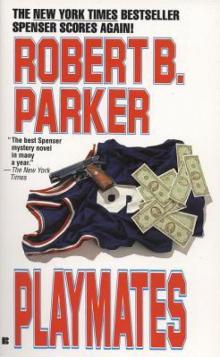 Playmates
Playmates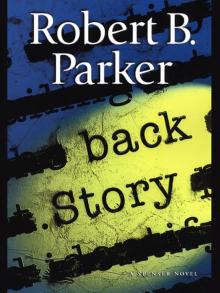 Back Story
Back Story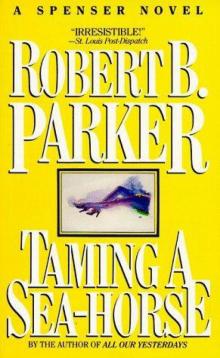 Taming a Sea Horse
Taming a Sea Horse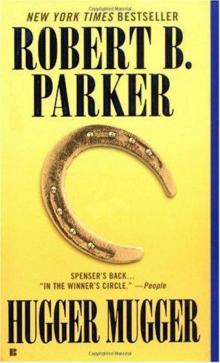 Hugger Mugger
Hugger Mugger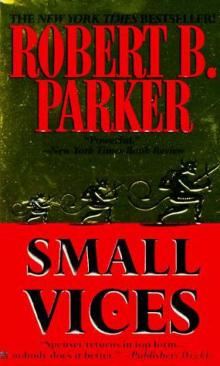 Small Vices s-24
Small Vices s-24 Silent Night: A Spenser Holiday Novel
Silent Night: A Spenser Holiday Novel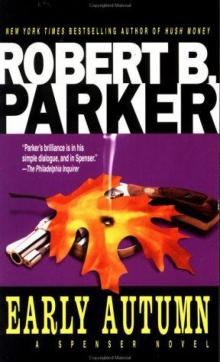 Early Autumn s-7
Early Autumn s-7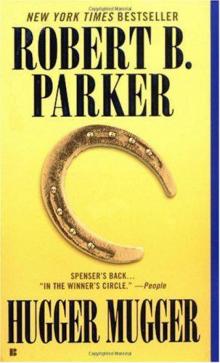 Hugger Mugger s-27
Hugger Mugger s-27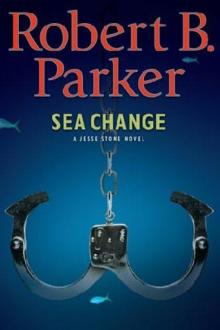 (5/10) Sea Change
(5/10) Sea Change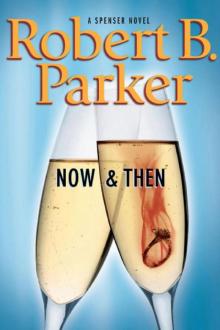 Now and Then
Now and Then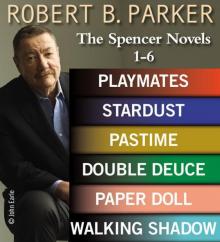 Robert B. Parker: The Spencer Novels 1?6
Robert B. Parker: The Spencer Novels 1?6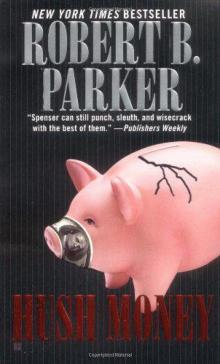 Hush Money s-26
Hush Money s-26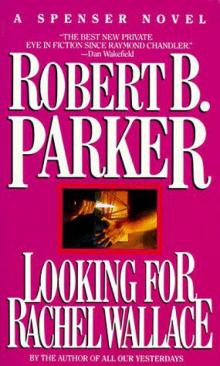 Looking for Rachel Wallace
Looking for Rachel Wallace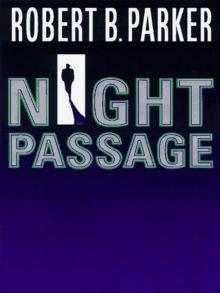 Night Passage
Night Passage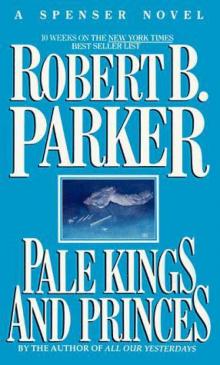 Pale Kings and Princes
Pale Kings and Princes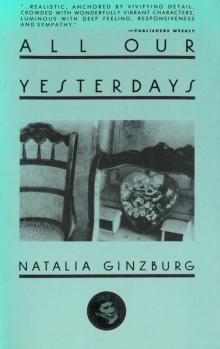 All Our Yesterdays
All Our Yesterdays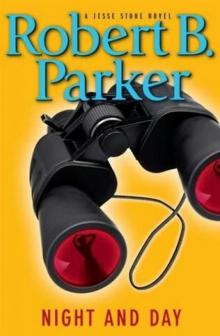 Night and Day js-8
Night and Day js-8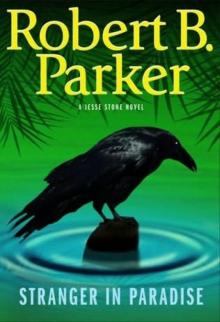 Stranger in Paradise js-7
Stranger in Paradise js-7 Double Play
Double Play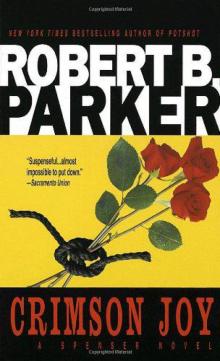 Crimson Joy s-15
Crimson Joy s-15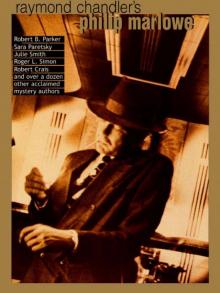 Raymond Chandler's Philip Marlowe
Raymond Chandler's Philip Marlowe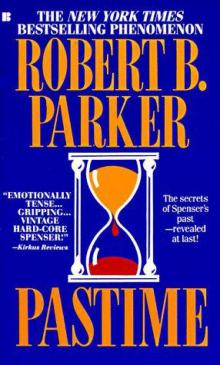 Pastime
Pastime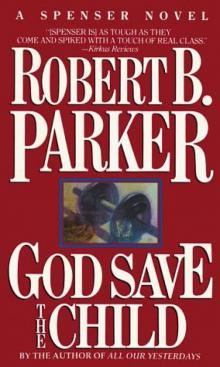 God Save the Child s-2
God Save the Child s-2 Bad Business
Bad Business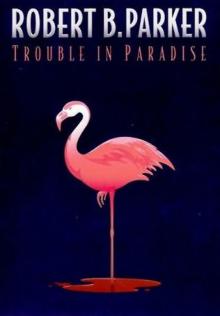 Trouble in Paradise js-2
Trouble in Paradise js-2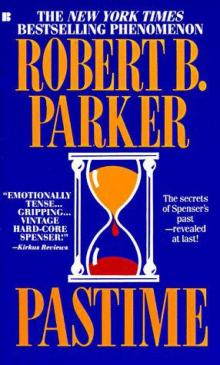 Pastime s-18
Pastime s-18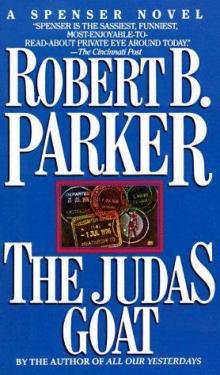 The Judas Goat s-5
The Judas Goat s-5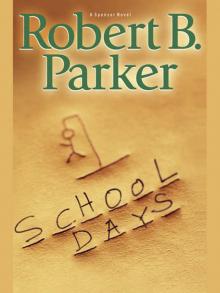 School Days
School Days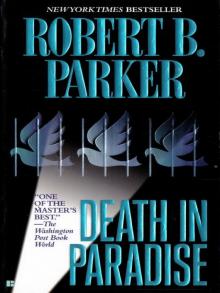 Death In Paradise
Death In Paradise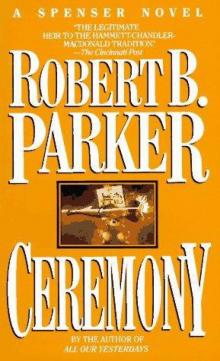 Ceremony
Ceremony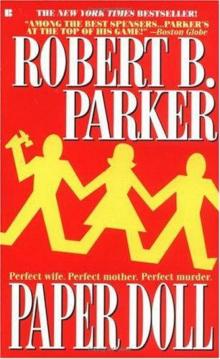 Paper Doll s-20
Paper Doll s-20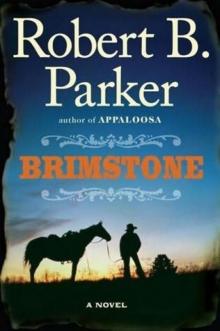 Brimstone vcaeh-3
Brimstone vcaeh-3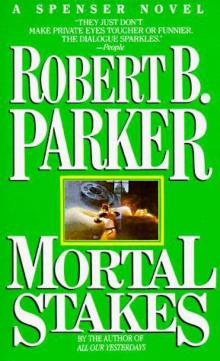 Mortal Stakes s-3
Mortal Stakes s-3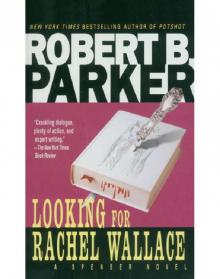 Spencer 06 - Looking for Rachel Wallace
Spencer 06 - Looking for Rachel Wallace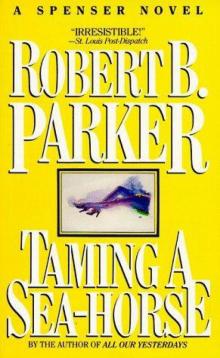 Taming a Sea Horse s-13
Taming a Sea Horse s-13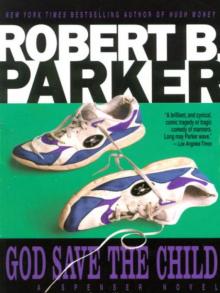 God Save the Child
God Save the Child Chance
Chance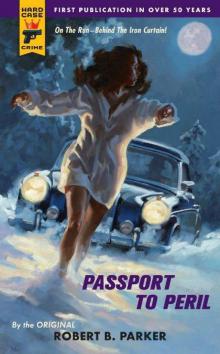 Passport To Peril hcc-57
Passport To Peril hcc-57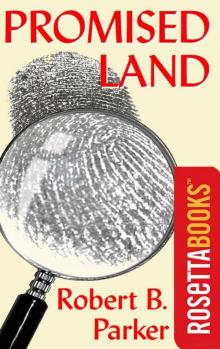 Promised Land
Promised Land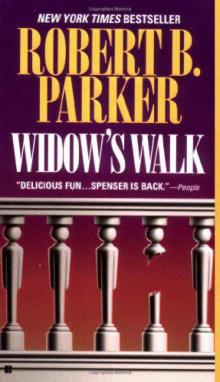 Widow’s Walk
Widow’s Walk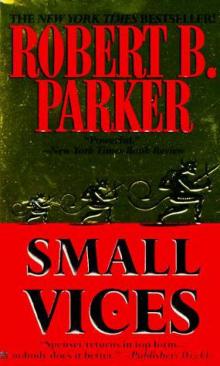 Small Vices
Small Vices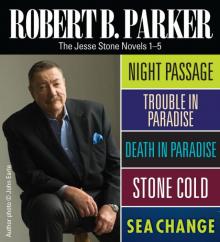 Robert B Parker: The Jesse Stone Novels 1-5
Robert B Parker: The Jesse Stone Novels 1-5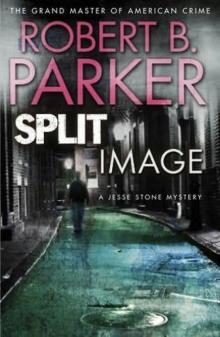 Split Image js-9
Split Image js-9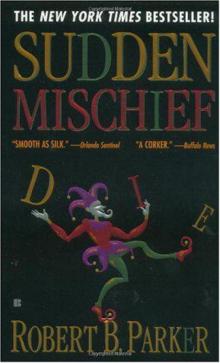 Sudden Mischief s-25
Sudden Mischief s-25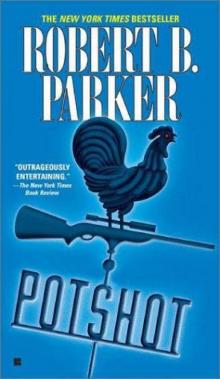 Potshot s-28
Potshot s-28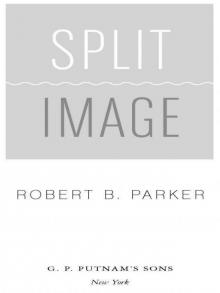 Split Image
Split Image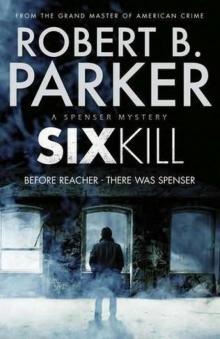 Sixkill s-40
Sixkill s-40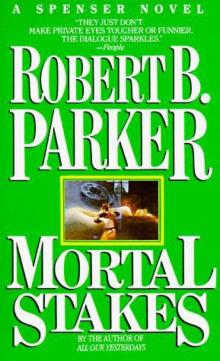 Mortal Stakes
Mortal Stakes Stardust
Stardust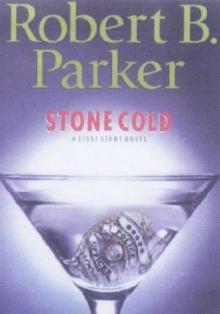 Stone Cold js-4
Stone Cold js-4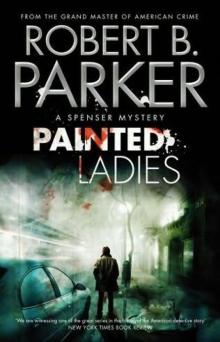 Painted Ladies s-39
Painted Ladies s-39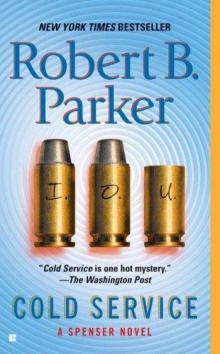 Cold Service
Cold Service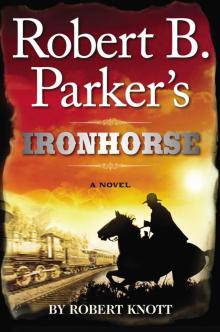 Ironhorse
Ironhorse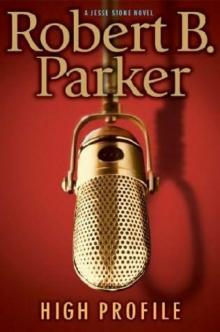 High Profile js-6
High Profile js-6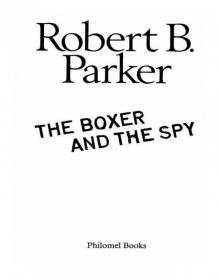 The Boxer and the Spy
The Boxer and the Spy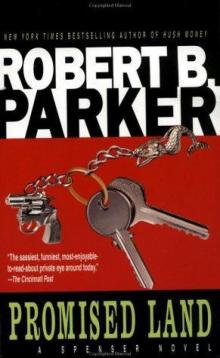 Promised Land s-4
Promised Land s-4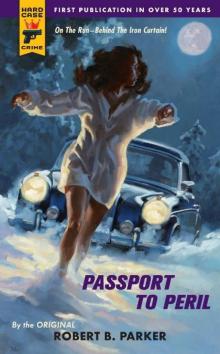 Passport to Peril (Hard Case Crime (Mass Market Paperback))
Passport to Peril (Hard Case Crime (Mass Market Paperback))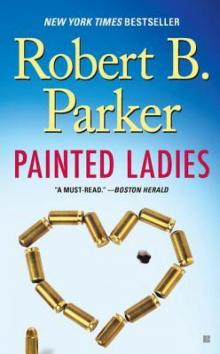 Painted Ladies
Painted Ladies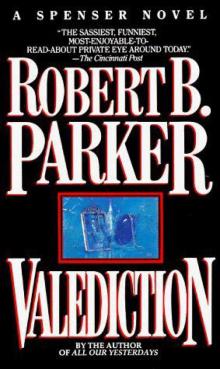 Valediction
Valediction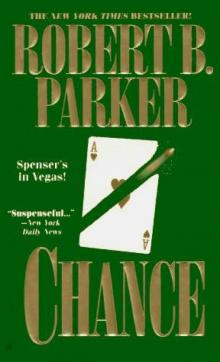 Chance s-23
Chance s-23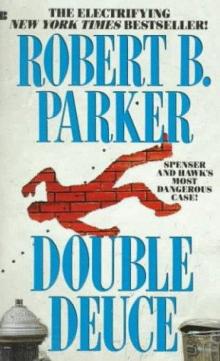 Double Deuce
Double Deuce Wilderness
Wilderness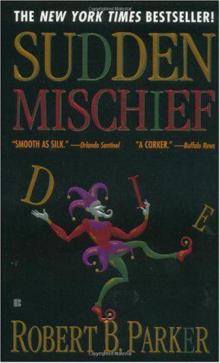 Sudden Mischief
Sudden Mischief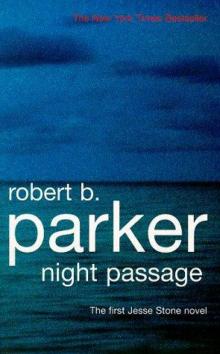 Night Passage js-1
Night Passage js-1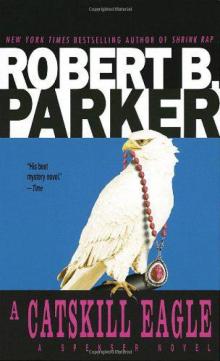 A Catskill Eagle
A Catskill Eagle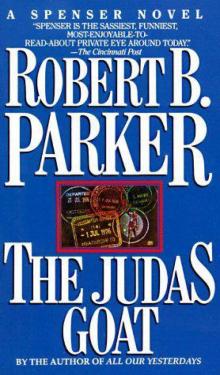 The Judas Goat
The Judas Goat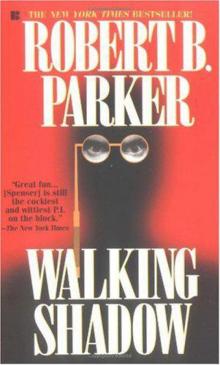 Walking Shadow
Walking Shadow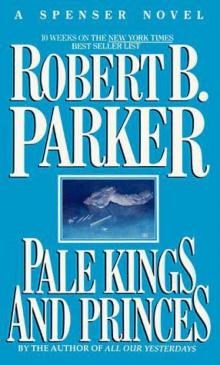 Pale Kings and Princes s-14
Pale Kings and Princes s-14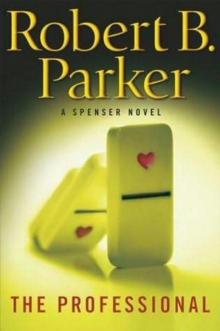 The Professional
The Professional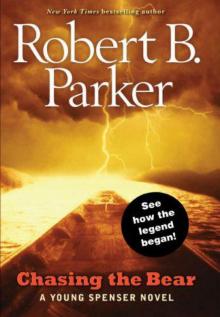 Chasing the Bear s-37
Chasing the Bear s-37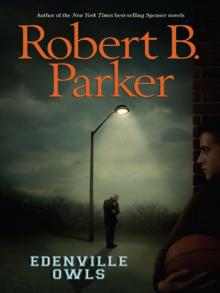 Edenville Owls
Edenville Owls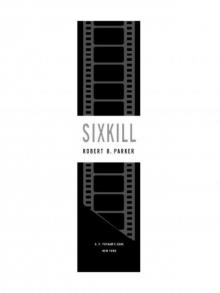 Sixkill
Sixkill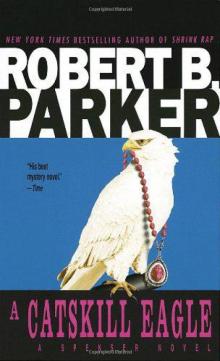 A Catskill Eagle s-12
A Catskill Eagle s-12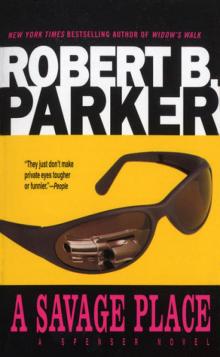 A Savage Place
A Savage Place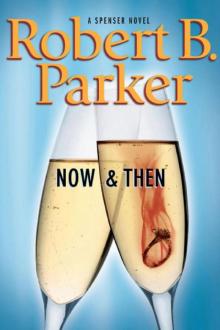 Now and Then s-35
Now and Then s-35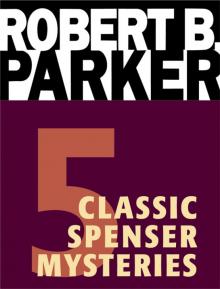 Five Classic Spenser Mysteries
Five Classic Spenser Mysteries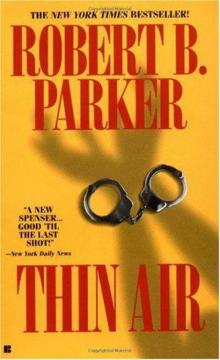 Thin Air s-22
Thin Air s-22